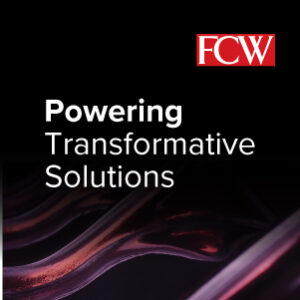In a recent survey of FCW readers, respondents’ top priorities were modernizing cybersecurity (71%), improving data capture and analysis (66%), managing a mix of on-site and remote employees (65%), improving customer experience (63%) and expanding cloud (61%). Successfully combining those priorities requires identifying and then integrating best-of-breed solutions. 72% of respondents said their agencies rely on SIs for complex IT projects. Those large, established contractors often have decades of experience building government IT systems, and they understand how agencies work. They also understand the value of modernizing those systems to take advantage of the latest technology and keep pace with mission goals. Learn how SIs play a key role as a conduit for innovations developed by private companies, and how they are evolving to meet the government’s need for digital transformation, in Carahsoft’s Innovation in Government® report.
Driving Modernization with Deep Strategic Partnerships
“There are three key challenges that are driving demands for digital transformation. First, a tremendous explosion of data has made it extremely difficult for government agencies and mission owners to make sense of all the information that is being generated across their IT environments. Second, cyber-threats and hacking campaigns are becoming more frequent and significantly more sophisticated. In addition to the well-publicized Colonial Pipeline and SolarWinds-based attacks in 2021, the FBI reported a 300% increase in cybercrimes and security breaches since the start of the pandemic, and officials expect those efforts to continue. Third, agencies are running hybrid IT environments that include on-premises legacy infrastructure, cloud-based technology, and any number of fog and edge computing devices such as mobile phones, laptops, 5G-enabled devices and smart sensors. That means agency systems are becoming more complex and harder to manage.”
Read more insights from Leidos’ Vice President and Director of the Digital Modernization Accelerator, Derrick Pledger.
Why Success in Zero Trust Requires a Team Effort
 “Although it has recently been getting a lot of attention, zero trust is actually the evolution of a security philosophy that has been building for years. It starts by giving users the least amount of privileges to perform their jobs and operating under the assumption that systems have already been breached. Zero trust focuses on the connection between users and the data, applications, networks and systems they want to access. In zero trust architectures, new administrative tools continually evaluate whether allowing an individual user to have a certain level of access privileges is the right thing to do. The approach gives agencies much more flexibility as they modernize because they can make decisions at a granular level that enable them to secure data and entire IT ecosystems. President Joe Biden’s executive order on cybersecurity mandates the use of zero trust, which puts a lot of weight behind a consistent and coordinated adoption of the approach.”
“Although it has recently been getting a lot of attention, zero trust is actually the evolution of a security philosophy that has been building for years. It starts by giving users the least amount of privileges to perform their jobs and operating under the assumption that systems have already been breached. Zero trust focuses on the connection between users and the data, applications, networks and systems they want to access. In zero trust architectures, new administrative tools continually evaluate whether allowing an individual user to have a certain level of access privileges is the right thing to do. The approach gives agencies much more flexibility as they modernize because they can make decisions at a granular level that enable them to secure data and entire IT ecosystems. President Joe Biden’s executive order on cybersecurity mandates the use of zero trust, which puts a lot of weight behind a consistent and coordinated adoption of the approach.”
Read more insights from Leidos’ Vice President and Director of the Cyber Accelerator, Meghan Good.
How Multi-Domain Operations Accelerate Modernization
“True modernization requires a fundamental shift in how the government constructs its core systems, from IT to weapons to command and control. Agencies must switch from old-school, bespoke, closed architectures to the more agile, open, nonproprietary frameworks that enable rapid, iterative improvements. Open architectures also enable agencies to prioritize interoperability and data sharing between systems in an approach known as multi-domain operations. By design, multi-domain operations must involve a broad range of partners to achieve the desired mission outcomes, particularly as threats continue to rapidly evolve. Making such a shift allows military and civilian agencies to far more rapidly add new capabilities to individual systems. The approach also enhances agencies’ ability to partner with industry to harness the power of cross-domain, cross-agency and even cross-company digital synergies.”
Read more insights from Leidos’ Vice President of Multi-Domain Operations Solutions, Chad Haferbier.
Balancing Speed and Security with SecDevOps
“Agile development and delivery, while paramount, cannot come at the expense of security. At Leidos, we believe security isn’t a checkbox exercise after software is built. The only way to overachieve on security is to make it first and central to everything we do. That’s why we say SecDevOps instead of DevSecOps. That approach gives us the ability to rapidly and reliably deploy software, operate it and understand how it’s working so that we can enhance and update it in a secure way. In other words, we’re not just pushing out new software. We are refactoring and maintaining software, proactively adjusting our security posture because adversaries never stop trying to get in. They’re constantly evolving, and our software has to evolve and outpace those threats.”
Read more insights from Leidos’ Vice President and Director of the Software Accelerator, Paul Burnette.
Bringing Secure Cloud Technology to Government
“Many agencies have already embraced cloud technology and now work with multiple providers to access software as a service, platform as a service and infrastructure as a service while also managing multiple on-premises data centers. Unfortunately, agencies typically do not have centralized visibility into all those resources, which makes it extremely challenging to manage existing applications and infrastructure, let alone develop new applications. The situation becomes even more complex when agencies start adding policy enforcement, security services, compliance management and container orchestration.”
Read more insights from ManTech’s Senior Vice President and CTO, Srini Iyer.
Download the full Innovation in Government® report for more insights from these digital transformation and emerging technology thought leaders and additional industry research from FCW.






